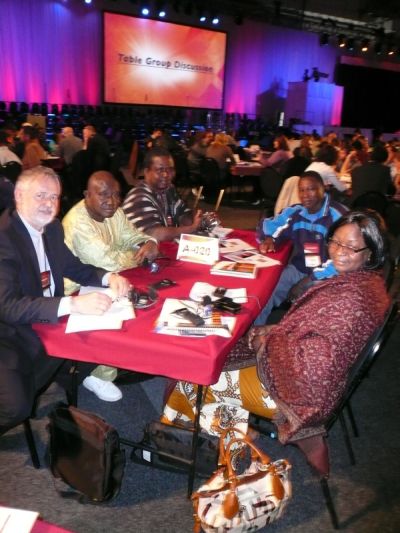The Lausanne Movement has played a key role in the “identity process” of the Evangelicals. While Lausanne I (1974, Lausanne, Switzerland) focused on defining the Covenant and Lausanne II (1989, Manila, Philippines) proposed a missionary strategy, Lausanne III reaffirmed the previous commitments. In this spirit Cape Town 2010 was a congress on world evangelization with the presence of a wide range of evangelical Christians sharing concerns and hopes about Christian mission. The outcome of the congress was drafted in the “Cape Town Commitment”, which final version should be available by the end of November. Its main message can be summarized as follows: human beings are lost, the gospel is good news and the church’s mission goes on (the draft can be read at full length under http://conversation.lausanne.org/en/conversations/detail/11544).
However it became obvious during the congress that defining (real) Christians is not an easy task for Evangelicals. It is unclear at which point a person should be considered as evangelized. It also has to be stressed that for example Evangelicals from the US have concepts of evangelization which differ significantly from the idea of mission that is practiced in Switzerland by the Old Catholic Church as well as by other institutionalized churches in Europe. For example the proposed idea of striving to actively evangelize the Turkish Muslim community in Switzerland is not an idea shared by the stately recognized Churches in Switzerland. I also found the lack of visions about ecumenism and unity of the church remarkable, as those should have been in my opinion issues that need discussion. The wide range of ways to spread the gospel used by Evangelicals is however very impressive: it favors personal contacts and exchanges, Bible studies and prayer are given an important role, and the use of mass-media and music are just two examples of creative ways of announcing the Gospel.
As an official observer on behalf of the Old-Catholic Church I received a very warm welcome in Cape Town at the Lausanne III Congress. Besides others Dr Douglas Birdsall, Executive Chair of the Congress, toke time for a personal greeting. Revd Canon Andrew Norman from the Anglican Church, who was the designated host for the observers, toke very good care of the observers. This was very much appreciated especially since there were over four thousands people from about 180 countries attending the congress. To establish personal contacts despite the overwhelming number of people present can be considered a great achievement of Lausanne III. Attendants were organized in small groups of 6-7 people and worked in between plenary sessions on small projects.
Beside myself as a representative of the Old Catholic Church also a delegation of Roman Catholics (5 people), an orthodox delegation (two people) and a delegation from WCC Geneva (9 people), were invited in the role of observers. The sharing of this role lead to interesting contacts. It might be worth thinking about three particular ways how those establishes connections could be followed up: 1. Deepening the contact to the Pontifical Council for Promoting Christian Unity; 2. Possibility to have an Old-Catholic observer in the working group between Roman Catholic Church and the World Evangelical Alliance (WEA); 3. Contact with representatives of the Swiss Evangelicals. When those contacts will be continued ecclesiological questions and other theological issues will have to be named and discussed more explicitly if reaching Church unity is a goal.
Rev. Ioan L. Jebelean

